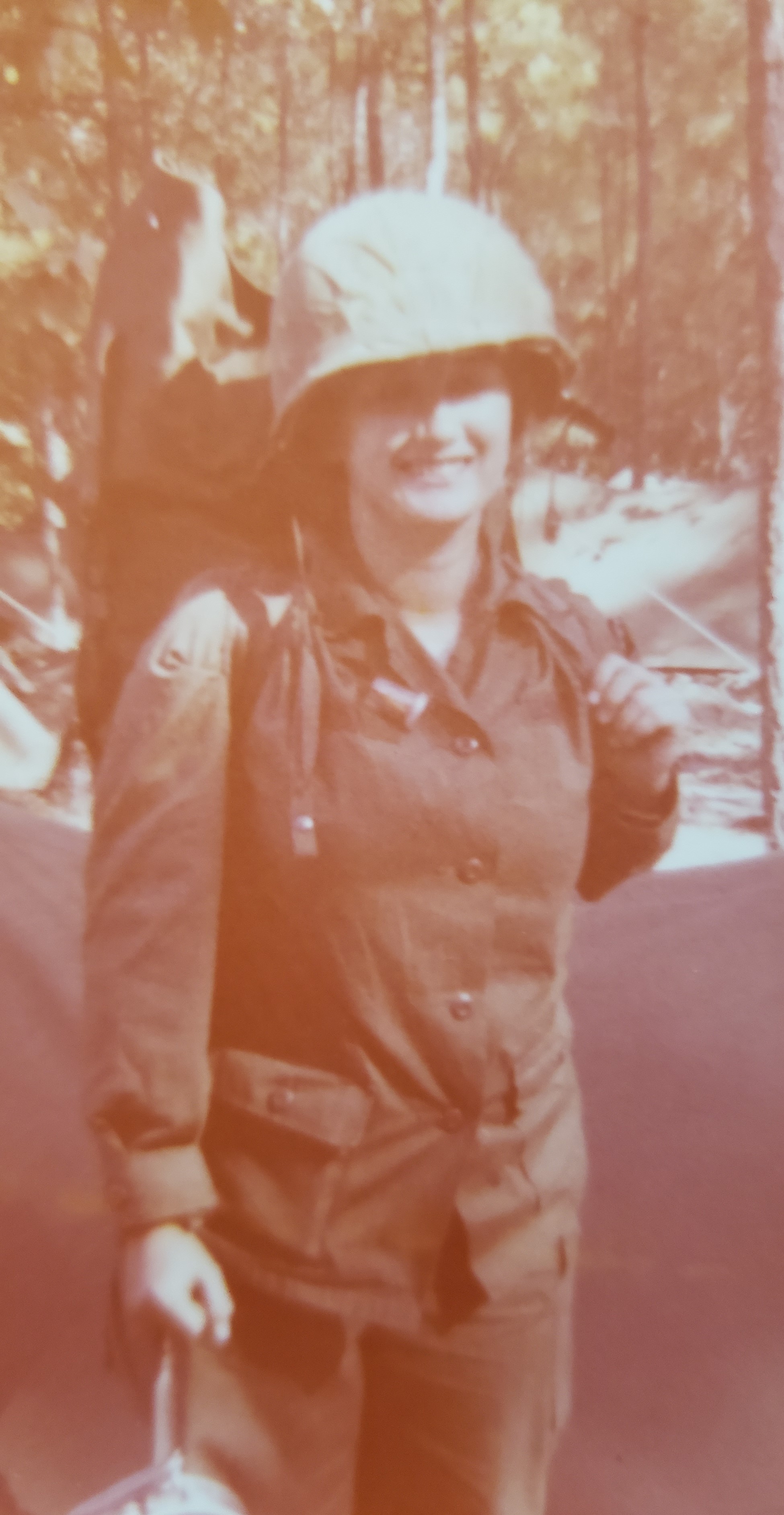From Fatigues and Boots to Wills and Trusts: An Account from a U.S. Army Veteran

I remember watching television when John-John saluted his father’s coffin (the coffin of President John F. Kennedy) draped with the America flag in November, 1963. The news media referred to him as a “little soldier.” I was overcome with emotion. Several years later, one of my sister’s bought a 45 rpm record titled “Ballad of the Green Berets.” I would play the record over and over again and march around the dining room. I remember my oldest brother trying to get into every branch of the military service only to be denied because he could not straighten his arm. I still recall the proud moments that my family celebrated when a cousin would come home on leave from the Army, dressed in uniform, making his dutiful rounds to visit family. Growing up in the Vietnam era was an emotional and memorable time as I recall the military funeral for a cousin killed in combat. So many youthful memories only made my feelings and beliefs of patriotism stronger. So, when I was 17, I went to an Armory in Streator, Illinois to meet with an Army recruiter. I made a decision to join the Army.
My parents had to agree to my enlistment under a deferred enlistment because I was not yet 18. Even though my parents got some push back from a couple of my father’s siblings, my parents agreed to sign. My parents knew I was determined to join, if not on a deferred enlistment, then I would join when I turned 18. I was the youngest of 10 children and thought that growing up in a large family would prepare me for anything. Joining the Army was a culture shock for me. I grew up in a small mid-west town where it seemed there was a church on every corner, I learned to adapt and enjoy the rich diversity and comradery of Army life.
Less than 2 weeks after I turned 18, I went to Chicago with my recruiter to go through the initial processing. After more than 40 years some of it is a blur to me. I remember taking a written test, going through a medical exam, filling out security forms, and at the end of it taking an oath before the United States flag. It is difficult to put in words how great I felt taking the oath. I passed my tests and would soon be on my way to Fort Jackson, South Carolina for basic training and Advanced Individual Training (AIT). Not only are there standard operating procedures, rules and regulations, there is an acronym for almost everything!
Upon arriving at the in-processing station at Fort Jackson, I was a little surprised by the barracks. It was the same as I saw growing up watching Gomer Pyle USMC or other war stories. The barracks was a large, long room with steel bunk beds lined up on each side of the room with metal lockers in between the bunk beds. After a couple of days of in-processing, which included receiving uniforms and military identification cards, we were sent off to our company in cattle cars, the mode of transportation (other than by foot) for the next several weeks. These were the old style cattle cars that had no seat belts or air conditioning. The barracks were different from the barracks at the in-processing center. Now I was in a much smaller room with no bunkbeds, just a room with twin beds and 7 other soldiers. Each of us had our own storage locker next to our bed.
Basic training for me was not only physical training, but mental and emotional discipline. Despite my stubbornness and belief that I could do anything, it was important that I understand and accept my limitations because everything in the military is about team work. A chain is only as strong as its weakest link, and I certain did not want to be a weak link. Each week of basic training covered something different. If you failed at the end of a week, you would be recycled to another basic training unit that was training on the week you failed; recycling extends your basic training. No one wanted to be recycled because you already formed a bond with the soldiers in your company.

Dorothy Milam - Basic Training
I attended numerous classes, from the military basics of learning the rank of each branch of service (which became especially important when I was assigned to the Pentagon), first aid classes, to learning how to make a bed so tight you could bounce a quarter off it. The survivorship training was more physically intensive from training in hand-to-hand combat, maneuvering the obstacle course and managing the low-crawl with wire above, and getting over the wall (which was not an easy task for me), qualifying on the firing range with the M-16 and disassembling, cleaning and reassembling the weapon. I learned how not to throw a grenade out of a foxhole, the importance of guard duty, survival training in the field, reading maps and assembling a tent. We went on night hikes and learned about chemical warfare, the importance of staying hydrated and the sustenance of a MRE (meal ready to eat). We were issued a P-38 to open cans when we were out on bivouac. To this day, I continue to use the P-38 at home because it has always out performed any can opener on the market. Some of the training is meant to instill the importance of following orders and step-by-step instructions, such as the steps for getting the gas mask ready and putting it on quickly upon entering the room where tear gas was released. If you missed a step, then you physically suffered the consequences. After attempting to throw a grenade from a fox-hole that is definitely not designed for someone who is only 5 feet tall, I quickly learned my limitations….I was not suited for combat duty.
An event that stands out in my memories is from the first few days in basic training. We were all lined up to go into the chow hall, when Reveille sounded. One soldier failed to immediately come to attention and salute, so we were all ordered to drop down and do pushups. It wouldn’t have been that bad, but it had rained the night before, so we were doing pushups in the mud after spending a lot of time the night before shining boots and starching fatigues. That was a lesson for all of us. We were a team, and if one of us messed up, we all suffered the consequences. Even now, when I drive through Rosslyn and see The Old Guard soldiers running out of Fort Myer, I know it is a teaching moment for the entire team if they are dressed in full military gear with the ruck sack instead of running shorts (something that was not issued when I was on active duty). We ran in fatigues and combat boots.
After graduating basic training, I remained at Fort Jackson for AIT. I enjoyed AIT because we were finally given some freedom on the weekends. We could actually leave post and venture into Columbia, SC for some sight-seeing, concerts or whatever we wanted as long as we stayed out of trouble! I was fortunate to graduate at the top of my class in AIT, so I was given an opportunity to pick my assignment. My choices were the Pentagon, Fort Meade, Fort McNair or Germany. I choose the Pentagon. I was assigned to the Office of the Deputy Chief of Staff for Research, Development and Acquisition. I lived at the barracks at Fort Myer, Virginia, home of The Old Guard and the Army’s Fife and Drum Corp.
At Fort Myer, I was no longer sharing a room with 7 other soldiers, I was sharing a room with 3 other soldiers, that soon became a room of my own when my comrades moved out over time to live off post. I loved living at Fort Myer, the barracks bordered Summerall Field, where many military ceremonies were performed by the Fife and Drum Corps and soldiers of The Old Guard. When I would leave the barracks to go to the mess hall, Army National Cemetery was in clear view. Living at Fort Myer and working at the Pentagon strengthen the love I have for the United States of America and my patriotic sense of duty and loyalty.
Working at the Pentagon was powerful. It seemed like every document was classified. I worked with civilians as well as other Army soldiers. The civilians could go home at 3 or 3:30 each day even during budget season while my comrades and I worked through the night into the early hours of the morning. What I didn’t realize when I picked the Pentagon as my duty station, was that there were so many officers and enlisted soldiers of all branches of service going in and out on a daily basis. I was enlisted. When an enlisted soldier is in uniform and passes an officer in uniform, you are required to salute. It seems like somedays I needed to hold my arm up in a salute the entire time I was going up or down the Pentagon steps. I am surprised I never pulled a muscle or tendon from raising and lowering my arm on a frequent basis, like a bird flapping a wing.
I did not re-enlist after my 3 years were up because of a family decision. I loved my time in the Army and tried to re-enlist after 9-11 but was not able at the time because of the Army’s rules on age. Sadly, I was too old! I loved the Army because we were not labeled by race, religion, or sexual orientation; we were a diverse group of soldiers. We had to rely upon each other, we were a team, we were family, each of us had a job to perform, and we had fun; we were soldiers first and foremost.
My connections to the military has never ended, I was the spouse of a soldier in The Old Guard, 3rd US Infantry, the mother-in-law of a soldier in The Old Guard, 3rd US Infantry, one of my nephews recently retired from the Air Force, I have a great-nephew on active duty with the Marine Corp and a great-niece on active duty in the Navy, as well as several cousins on active duty in the Marine Corp, several of my neighbors have been active-duty and retired Army officers and my near-by “Cheers-type” pub is often filled with retired military of all branches. Last year at the Fort Myer Commissary, my partner and I ran into General Mathis doing his own grocery shopping. Several times this summer, my partner and I ran past General McChrystal who was out for a run near my home. I am not the type of person who gets excited seeing politicians, musicians or actors; I get excited when I see soldiers. Most of all, my partner of many years and soon to be husband is a retired Army Colonel, a former Commander of 5th Group Special Forces at Fort Campbell, Kentucky. Who would have thought that the young girl marching around the dining room to the “Ballad of the Green Berets” would soon be marrying and walking beside her own Green Beret!
Dorothy Milam is a Paralegal in Paley Rothman’s Estate Planning and Estate & Trust Administration practice groups. She writes this account of her experiences as a U.S. Army Veteran in celebration of Veteran’s Day.

